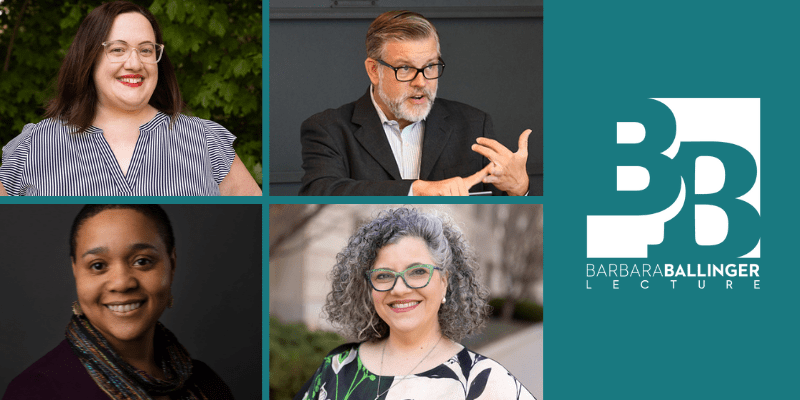Across the United States, a movement has been growing to censor books in schools and public libraries, especially books by and about people of color and members of LGBTQ+ communities.
As your public library, we will continue to make challenged and endangered books accessible to everyone, and to educate our community on the history and current reality of book challenges and censorship attempts.
Below, we talk with a few of the panelists for this year’s Barbara Ballinger Lecture, which will dive into intellectual freedom, book bans, and censorship. Please join us in person or virtually on Saturday, November 11, 1-2 pm.
Oak Park is known as a progressive community, and earlier this year we became a Book Sanctuary Community. Illinois also has elected officials who generally support libraries, plus a new state law that protects against book bans. Still, what would you say to someone who might think that book censorship attempts couldn’t happen in a community like Oak Park?
Emily Knox, associate professor, School of Information Sciences, University of Illinois at Urbana-Champaign: “Censorship attempts happen in all communities and for all sorts of reasons. People censor books from the left, the right, and all points in between. All libraries (and schools!) should be prepared to respond to these requests.”
Kelly Jensen, Book Riot: “Unfortunately, it does not matter how progressive you believe your community to be. People working to remove books do not care about borders, nor do they care about whether or not the library they target is the one they use. The truth is book bans—and the stochastic terrorism being experienced by public and school libraries—is in every community and/or will touch every community in some capacity. We’re entering the third year of this manufactured crisis and it’s not letting up any time soon. Instead, we’ll continue to see new and more dangerous tactics employed. At the end of the day this is not, nor has it ever been, about books. The books are simply the tool to push forth hateful, bigoted beliefs.”
John Chrastka, executive director, EveryLibrary: “Book bans aren’t always about the First Amendment. In many places, book bans are used as direct attacks against LGBTQ+ and BIPOC communities. In those places, attempts to ban books are attempts to silence stories and erase people. Our part of Illinois is more progressive than many places, but we are seeing calls to ban books in suburban Chicago. It is being resisted in places like Downers Grove, where the Proud Boys have shown up to protest books, and in Lincolnwood, where the fight for the freedom to read is about whose stories get to be told. Oak Park’s inclusive ethos and diverse community are a reason people move here and want to raise their families. But no library is immune from outside attacks or the soft censorship that comes from second-guessing whose stories are valid. It takes vigilance and true dialogue to focus on equity.” Due to a family emergency, Chrastka will be unable to participate in the November 11 panel discussion event.
What can the average person do to support their libraries and the freedom to read?
Jensen: “It’s simple: show up to board meetings, either in person or via email, letting the board know what your library is doing right. Check materials out and recommend materials, especially those by or about marginalized people. Write to and get into the ears of local, state, and national elected officials whose job is to work for you and demand they protect the First Amendment Rights of all.
“Tell your library workers they are doing a good job and you appreciate their work. This is not the message they’re receiving from the media and even if it feels ‘small,’ it can make their day, week, or month.”
Knox: “Read banned books! Support the authors who are targeted. Show up at your local board meetings. Learn more about the history of the freedom to read and why it matters.”

